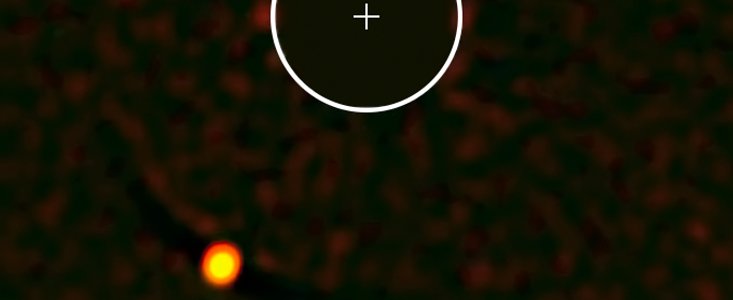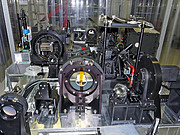Announcement
ESO’s SPHERE Unveils its First Exoplanet
6 July 2017
One of the most challenging and exciting areas of astronomy today is the search for exoplanets — other worlds orbiting other stars. The exoplanet HIP 65426b has recently been discovered using the SPHERE (Spectro-Polarimetric High-contrast Exoplanet REsearch instrument) instrument on ESO’s Very Large Telescope (VLT). Some 385 light-years from us, HIP 65426b is the first planet that SPHERE has found [1] — and it turns out to be a particularly interesting one.
The planet is warm (between 1000 and 1400 degrees Celsius), and is between six and twelve times the mass of Jupiter. It seems to have a very dusty atmosphere filled with thick cloud, and it orbits a hot, young star that rotates surprisingly fast. Unusually, given its age, the star does not appear to be surrounded by a disc of debris, and the absence of a disc raises puzzling questions about how the planet formed in the first place. The planet may have been formed in a disc of gas and dust and when the disc rapidly dissipated, it interacted with other planets to move to a more distant orbit, where we see it now. Alternatively, the star and the planet may have formed together as a binary system in which the more massive component prevented the other would-be star from accumulating sufficient matter to actually become a star. The planet’s discovery gives astronomers the opportunity to study the composition and location of clouds in its atmosphere, and to test theories of the formation, evolution, and physics of exoplanets.
SPHERE is a powerful planet finder installed on Unit Telescope 3 of the VLT. Its science goal is to detect and study new giant exoplanets around nearby stars using the direct imaging method [2]. This method aims to directly capture images of exoplanets and debris discs around stars, rather like taking a photograph. Direct imaging is difficult because the light of a star is so powerful that the feeble light reflected by orbiting planets is overwhelmed by the starlight. But SPHERE is cleverly designed to bypass this obstacle and to look for the polarised light reflected off a planet’s surface.
This image was captured as part of a survey programme called SHINE (SpHere INfrared survey for Exoplanets). SHINE aims to image 600 young nearby stars in the near-infrared using SPHERE’s high contrast and high angular resolution to discover and characterise new planetary systems and explore how they formed.
Notes
[1] A previous ESO press release reported an earlier SPHERE observation that was interpreted as a planet. However, that interpretation has been called into doubt and so HIP 65426b is currently the first reliable detection of an exoplanet by SPHERE.
[2] When scouring the Universe for exoplanets, astronomers have numerous tools at their disposal. Many planet detection methods are indirect — astronomers can detect the tell-tale dip in a star’s brightness when a planet transits across its face, or measure the tiny wobble in a star’s motion caused by the gravitational tug of any orbiting planets. However, there is a more direct method of finding an exoplanet: direct imaging.
Links
Contacts
Gaël Chauvin
Institut de Planetologie et d'Astrophysique de Grenoble (IPAG)
BP 53, 38041 Grenoble Cedex 9, France
Tel: +33 6 4551 8209
Email: gael.chauvin@univ-grenoble-alpes.fr
Jean-Luc Beuzit
Institut de Planetologie et d'Astrophysique de Grenoble (IPAG)
BP 53, 38041 Grenoble Cedex 9, France
Tel: +33 6 8739 6285
Email: jean-luc.beuzit@univ-grenoble-alpes.fr
Richard Hook
ESO Public Information Officer
Garching bei München, Germany
Tel: +49 89 3200 6655
Cell: +49 151 1537 3591
Email: rhook@eso.org
About the Announcement
| Id: | ann17041 |
Our use of Cookies
We use cookies that are essential for accessing our websites and using our services. We also use cookies to analyse, measure and improve our websites’ performance, to enable content sharing via social media and to display media content hosted on third-party platforms.
ESO Cookies Policy
The European Organisation for Astronomical Research in the Southern Hemisphere (ESO) is the pre-eminent intergovernmental science and technology organisation in astronomy. It carries out an ambitious programme focused on the design, construction and operation of powerful ground-based observing facilities for astronomy.
This Cookies Policy is intended to provide clarity by outlining the cookies used on the ESO public websites, their functions, the options you have for controlling them, and the ways you can contact us for additional details.
What are cookies?
Cookies are small pieces of data stored on your device by websites you visit. They serve various purposes, such as remembering login credentials and preferences and enhance your browsing experience.
Categories of cookies we use
Essential cookies (always active): These cookies are strictly necessary for the proper functioning of our website. Without these cookies, the website cannot operate correctly, and certain services, such as logging in or accessing secure areas, may not be available; because they are essential for the website’s operation, they cannot be disabled.
Functional Cookies: These cookies enhance your browsing experience by enabling additional features and personalization, such as remembering your preferences and settings. While not strictly necessary for the website to function, they improve usability and convenience; these cookies are only placed if you provide your consent.
Analytics cookies: These cookies collect information about how visitors interact with our website, such as which pages are visited most often and how users navigate the site. This data helps us improve website performance, optimize content, and enhance the user experience; these cookies are only placed if you provide your consent. We use the following analytics cookies.
Matomo Cookies:
This website uses Matomo (formerly Piwik), an open source software which enables the statistical analysis of website visits. Matomo uses cookies (text files) which are saved on your computer and which allow us to analyze how you use our website. The website user information generated by the cookies will only be saved on the servers of our IT Department. We use this information to analyze www.eso.org visits and to prepare reports on website activities. These data will not be disclosed to third parties.
On behalf of ESO, Matomo will use this information for the purpose of evaluating your use of the website, compiling reports on website activity and providing other services relating to website activity and internet usage.
Matomo cookies settings:
Additional Third-party cookies on ESO websites: some of our pages display content from external providers, e.g. YouTube.
Such third-party services are outside of ESO control and may, at any time, change their terms of service, use of cookies, etc.
YouTube: Some videos on the ESO website are embedded from ESO’s official YouTube channel. We have enabled YouTube’s privacy-enhanced mode, meaning that no cookies are set unless the user actively clicks on the video to play it. Additionally, in this mode, YouTube does not store any personally identifiable cookie data for embedded video playbacks. For more details, please refer to YouTube’s embedding videos information page.
Cookies can also be classified based on the following elements.
Regarding the domain, there are:
- First-party cookies, set by the website you are currently visiting. They are stored by the same domain that you are browsing and are used to enhance your experience on that site;
- Third-party cookies, set by a domain other than the one you are currently visiting.
As for their duration, cookies can be:
- Browser-session cookies, which are deleted when the user closes the browser;
- Stored cookies, which stay on the user's device for a predetermined period of time.
How to manage cookies
Cookie settings: You can modify your cookie choices for the ESO webpages at any time by clicking on the link Cookie settings at the bottom of any page.
In your browser: If you wish to delete cookies or instruct your browser to delete or block cookies by default, please visit the help pages of your browser:
Please be aware that if you delete or decline cookies, certain functionalities of our website may be not be available and your browsing experience may be affected.
You can set most browsers to prevent any cookies being placed on your device, but you may then have to manually adjust some preferences every time you visit a site/page. And some services and functionalities may not work properly at all (e.g. profile logging-in, shop check out).
Updates to the ESO Cookies Policy
The ESO Cookies Policy may be subject to future updates, which will be made available on this page.
Additional information
For any queries related to cookies, please contact: pdprATesoDOTorg.
As ESO public webpages are managed by our Department of Communication, your questions will be dealt with the support of the said Department.


